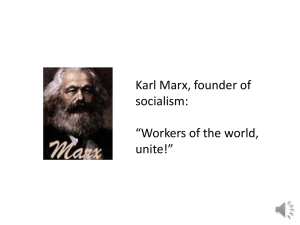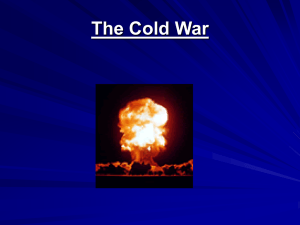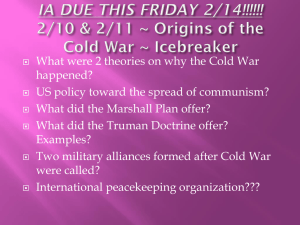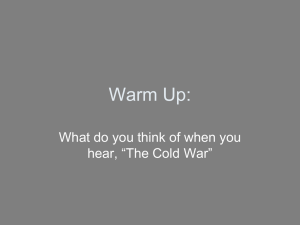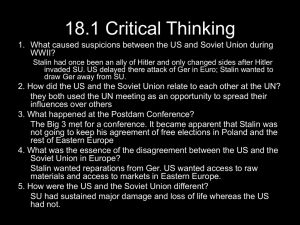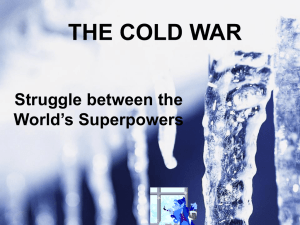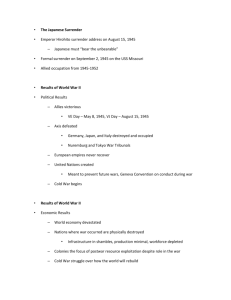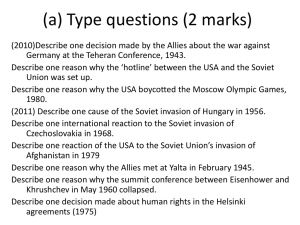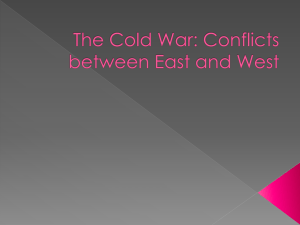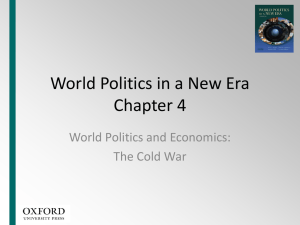Assess the impact of the early crises on US and USSR relations.doc
advertisement
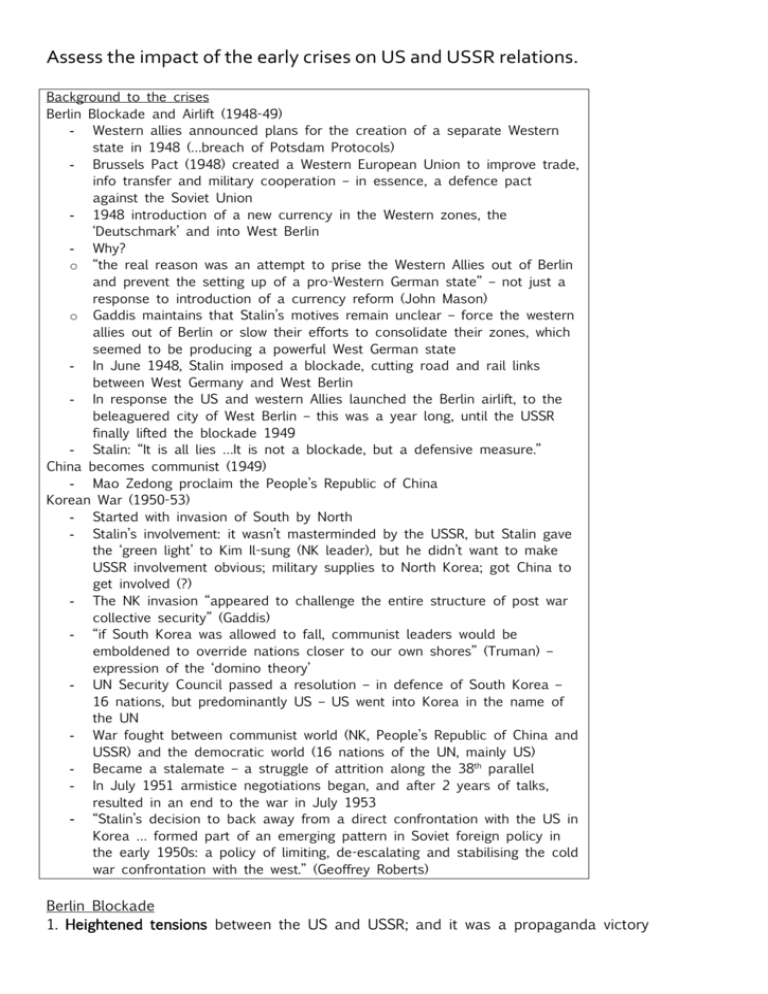
Assess the impact of the early crises on US and USSR relations. Background to the crises Berlin Blockade and Airlift (1948-49) - Western allies announced plans for the creation of a separate Western state in 1948 (…breach of Potsdam Protocols) - Brussels Pact (1948) created a Western European Union to improve trade, info transfer and military cooperation – in essence, a defence pact against the Soviet Union - 1948 introduction of a new currency in the Western zones, the ‘Deutschmark’ and into West Berlin - Why? o “the real reason was an attempt to prise the Western Allies out of Berlin and prevent the setting up of a pro-Western German state” – not just a response to introduction of a currency reform (John Mason) o Gaddis maintains that Stalin’s motives remain unclear – force the western allies out of Berlin or slow their efforts to consolidate their zones, which seemed to be producing a powerful West German state - In June 1948, Stalin imposed a blockade, cutting road and rail links between West Germany and West Berlin - In response the US and western Allies launched the Berlin airlift, to the beleaguered city of West Berlin – this was a year long, until the USSR finally lifted the blockade 1949 - Stalin: “It is all lies …It is not a blockade, but a defensive measure.” China becomes communist (1949) - Mao Zedong proclaim the People’s Republic of China Korean War (1950-53) - Started with invasion of South by North - Stalin’s involvement: it wasn’t masterminded by the USSR, but Stalin gave the ‘green light’ to Kim Il-sung (NK leader), but he didn’t want to make USSR involvement obvious; military supplies to North Korea; got China to get involved (?) - The NK invasion “appeared to challenge the entire structure of post war collective security” (Gaddis) - “if South Korea was allowed to fall, communist leaders would be emboldened to override nations closer to our own shores” (Truman) – expression of the ‘domino theory’ - UN Security Council passed a resolution – in defence of South Korea – 16 nations, but predominantly US – US went into Korea in the name of the UN - War fought between communist world (NK, People’s Republic of China and USSR) and the democratic world (16 nations of the UN, mainly US) - Became a stalemate – a struggle of attrition along the 38th parallel - In July 1951 armistice negotiations began, and after 2 years of talks, resulted in an end to the war in July 1953 - “Stalin’s decision to back away from a direct confrontation with the US in Korea … formed part of an emerging pattern in Soviet foreign policy in the early 1950s: a policy of limiting, de-escalating and stabilising the cold war confrontation with the west.” (Geoffrey Roberts) Berlin Blockade 1. Heightened tensions between the US and USSR; and it was a propaganda victory The first open conflict and confrontation between the two CW antagonists – “yet it did not lead to a hot war” (John Mason) – both sides avoided this; Mason indicates that Soviet restraint was probably because US had transferred sixty B-29 bombers to British bases, capable of carrying nuclear bombs, at the height of the crisis Aggressive Soviet move seen as a challenge to the Truman Doctrine and US resolve Suspicion and mistrust increased US military presence increased in Europe Outrage at Soviet behaviour, and an upsurge in anti-communist feeling Truman’s containment policy worked – and successful In fact, some historians contend it marked the real onset of the Cold War Brought America’s “relations with Russia to their worst ever” (Lowe) According to Bastian, tensions over Berlin completed the split between the Allies Berlin airlift was a propaganda victory – US liberation vs. Soviet repression 2. Saw the division of Germany – a clear division between East and West, communism and democracy established In May 1949, America, Britain and France united their occupation zones to become the Federal Republic of Germany (FRG), West Germany. In October 1949, the Soviet Union countered with the establishment of the German Democratic Republic (GDR), East Germany “But the division of Germany was, from the Soviet point of view, far from being an ideal solution to the German question.” (Geoffrey Roberts) “Berlin was the first confrontation in the nuclear age to show the strong tendency on both sides to freeze the geographical status quo.” (John Mason) 3. NATO and the Warsaw Pact Berlin blockade convinced the West of the need for military protection (also because of the Czech coup) April 1949, the western allies established NATO, North Atlantic Treaty Organisation. The western bloc “now had a formalised military-political existence.” (Geoffrey Roberts) Basis of the agreement: an attack on any one of them was an attack on them all NATO would be the military arm of the Truman Doctrine – a military containment; an anti-communist alliance According to Kort, the creation of NATO institutionalised the CW; a clear division of Europe into communist and capitalist had been created USSR responded with creation of the Council for Mutual Economic Assistance (Comecon) – to coordinate the economic policies of the eastern bloc states in line with Soviet economic policies. It laid the groundwork for the Warsaw Pact In 1955, the USSR set up the Warsaw Pact, an alliance of Communist states – the military equivalent of NATO 4. The arms race After Berlin, a competition began with both sides keen to build up their armies and weapons 1949, USSR gets atom bomb and superpower status – the race begins … 1951, US hydrogen bomb China becomes communist Chinese Communist leader Mao Zedong had proclaimed the creation of the People’s Republic of China in October 1949 America had funded its ally Chiang Kai-shek and his nationalist forces – they had lost It’s important to note that US government initially thought Mao would be the ‘Asian Tito’ – so the loss of communism would not amount to a ‘gain’ for Soviet Union. It turns out – Mao Zedong is a committed Marxist-Leninist, who announces that the new China must ally “with the Soviet Union … and form an international united front” Change of mind – Acheson “This Chinese government is really a tool of Russian Imperialism.” America’s reaction at government and citizen level – hysterical at this ‘loss’ to communism and success of USSR’s plans for world communist domination (but really USSR and Stalin had nothing to do with the ‘margarine Marxist[‘s]’ communist victory) USSR and China establish a Sino-Soviet Alliance (1950) – pledged to come to the assistance of one another in case of attack – more of a propaganda alliance (Stalin capitalised on the communist victory) Soviet Union boycotted UN Security Council from 1950 over its refusal to recognise the Communist China (meant US able to gain full vote to get involved in KW) National Security Paper No. 68 (NSC 68) – after news of the Soviet atom bomb testing and ‘loss’ of China to communism – o April 1950 – plans for increased military spending to accommodate a global war – to reclaim the initiative; called for a tripling of US defence spending, to meet the Soviet threat anywhere in the world o NSC 68 vision of potential Soviet world-domination o Truman’s containment policy expanded to a global vision Korean War (the ‘Pearl Harbour’ of the Cold War – Mason) E.g. of Truman’s containment policy, in Asia; US response was immediate & decisive Saw the focus of the CW shift to Asia War by proxy – no direct confrontation between the two superpowers. USSR via NK and China; US via UN It would not be a total war – although US briefly flirted with a rollback strategy – ‘containing’ communism enough Showed they were not prepared to use nuclear weapons, which set a precedent for future confrontations (Gaddis) Significant implications for the direction of American CW policy. “Its consequences for Washington’s strategy were … profound.” (Gaddis) “Before the war NATO was merely a statement of intent; after the war it was a full military alliance.” (Mason) o In 1952 plans drawn up to increase the number of NATO divisions from 14 to 50 and agreements made to set up bases for American ground, air and naval forces in Europe o “As a result of the KW, US military power was injected right into the heart of Europe.” (Mason) Mason makes the point that it was the outbreak of the war that led Truman to implement the NSC-68 – in 1951 he increased the defence budget to $50 billion Led to defence agreements like ANZUS and SEATO West Germany was admitted to NATO in 1954 “It is almost impossible to exaggerate the impact of the KW in shaping the course of the CW. The KW abruptly ended the incoherence of American foreign policy” (Mason)
